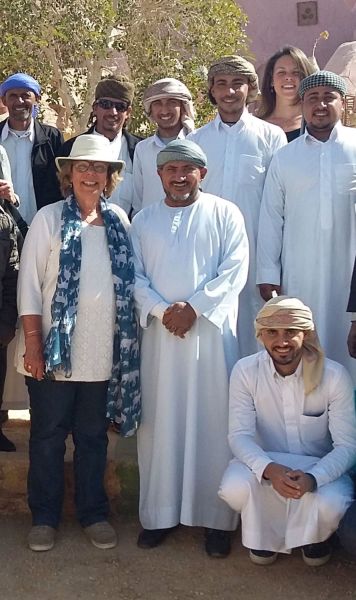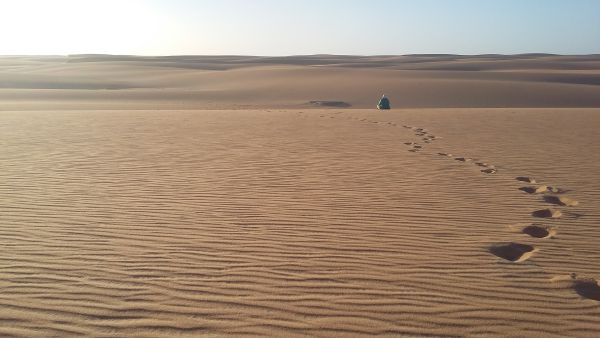|
Our Egyptian retreat centre
This year we visited the Western Sahara in Egypt for the fifth time.
Our favourite place to stay for our winter retreat is with the Bedouins in ’The Bedouin Village’, a marvellous place consisting of little, comfortable stupa-shaped houses, a large stupa shaped ‘satsangh hall’ and a big Bedouin tent, all looking out over the vast desert. This village is run by 17 brothers.
Over the years we have gotten to know them very well and have also slept on occasion in the desert where they cook us meals and sing genuine Bedouin songs around a fire. www.youtube.com/watch?v=-olywp9cPwI
Imam Sheik Abdul drawing near
For the solstice on 21 December 2012 we laid a large labyrinth out in the desert at the edge of the village grounds. www.youtube.com/watch?v=B1mFSHvOlZ8 Up to today it is completely intact and wonderfully maintained. By that time we had drawn the attention of Imam Sheik Abdul. We noticed that he watched us carefully from a distance. He came often to the tent at night where we would sing around the fire and were served tiny glasses of extremely sweet tea. The Bedouins sing their songs with drums and other instruments, we answer with our mantras and bhajans.
Invitation for the women
At our winter retreat visit last year (2015), we received a message for the women in our group from the Imam with the invitation to come to his house for a visit with the women of his tribe.
We heard that an Imam never invites anyone to his house. What a gesture. I felt this was a great reaching out and of course we gracefully took up the invitation. Luckily we have one student amongst us who speaks fluent Arabic and in that way we were able to have real good exchanges with the women.
From underneath their black dresses and veils, their questions to us were amazingly open and free, while a few were breast feeding naturally. Women’s business questions. Some of us played outside with about 20 children. The Imam, as the only man, served the women tea and cake. How auspicious.
January 2016, our turn
This year, on our turn, we invited the women to come to the Bedouin tent for a rich meal.
There they came, a row of about 25 women with their children, completely veiled, only showing their eyes. As soon as they entered the tent, unseen by the men, they took off their veils. Women amongst women.
We cooked a surfeit of dishes of dishes of great variety for them. We also brought out Dutch cookies laid out on large plates. They dived in freely and all food disappeared in no time. They took without having to be encouraged to serve themselves. Some lifted their dresses to play with a ball, and they sang and danced. My place was to sit next to the Sheik’s mother. Once in a while she touched my knee in appreciation. We have no photographs of this meeting in honour of their culture.
No women in the mosque
In one of my conversations I had had before with the Sheik, I asked to come to the mosque for the Friday prayers. He said that in his mosque, there is no place for women. The mosque is too small so there is no women's section. He must have heard my mind boggling. What must that mean for the women to be left out completely from prayers in a mosque? At that time I did not go deeper into the conversation, I took it as a matter of fact.
Satsangh with Imam Sheik Abdul for women only
I was immensely touched when the Sheik proposed to have a women’s gathering after our diner. We gathered for that in the Satsangh Hall. He sat on the asan, I sat in a chair next to him. The Bedouin women came all veiled again, except for his wife and his mother. The Western women, including me, were all wearing a shawl over their hair. This must have been the first time he spoke to women. Historical! He began to speak and spoke about the fundament of the Islam, being all pervasive boundless Love. He spoke about honouring women as the highest.
“A man came to the Prophet and said, ‘O Messenger of God! Who among the people is the most worthy of my good companionship?' The Prophet said: 'The Mother.' The man said, ‘Then who?’ The Prophet said: 'Then The Mother.' The man further asked: ‘Then who?’ The Prophet said: 'Then The Mother.' The man asked again, ‘Then who?’ The Prophet said: 'Then The Father.'”
Half way through the satsangh, the Imam wept, he could hardly speak. I also felt my heart overflowing over the scene of dissolving mind-made boundaries, gathering shoulder to shoulder in the ocean of consciousness. We embraced each other silently and left each in our own culture.
The Heart knows.

In love and gratitude, Jivanjili
|





